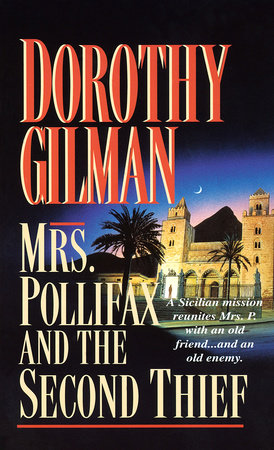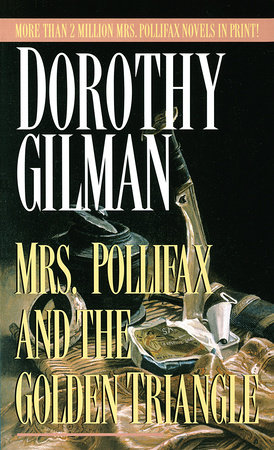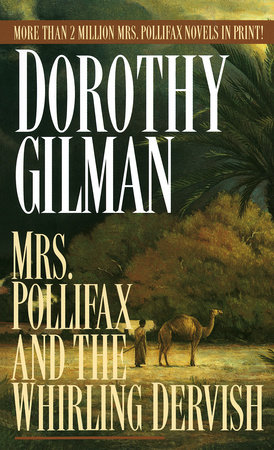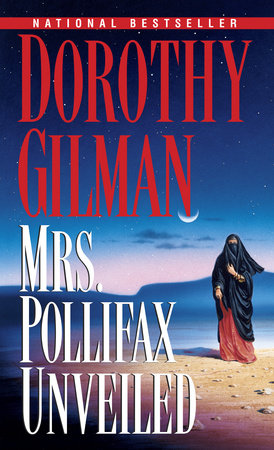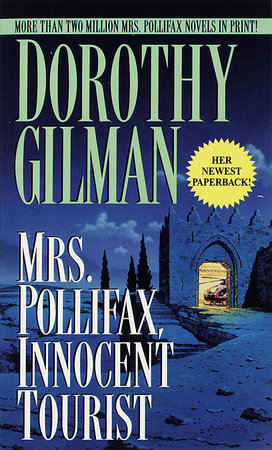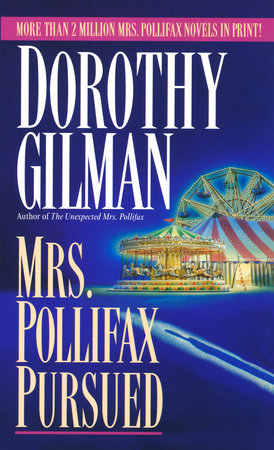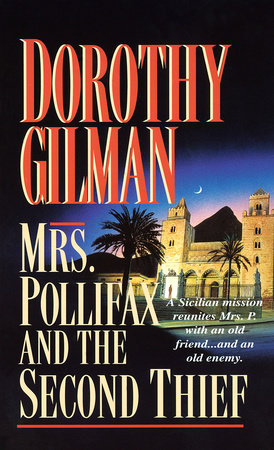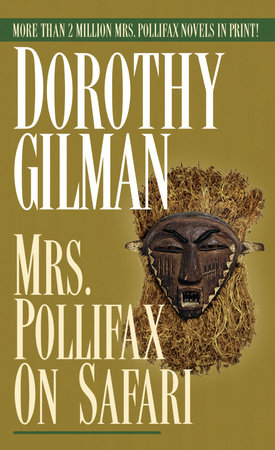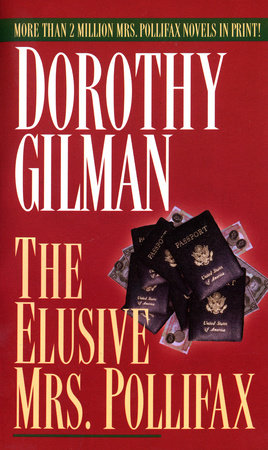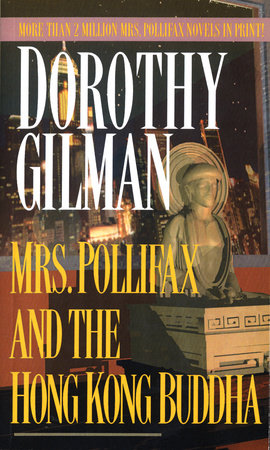Excerpt
Mrs. Pollifax and the Second Thief
Chapter 1Mrs. Pollifax stood under a dripping umbrella and wondered why it so often rained at funerals. Or at burials, she amended, staring out from under her umbrella at sodden flowers heaped around the grave, and a dozen figures in black, heads bowed as the words
ashes to ashes, dust to dust were intoned. She too was in black, wearing a veil that scratched her nose and made her very much want to sneeze; resisting this compulsion she gripped her purse more firmly in front of her with both hands and moved edgily to the left and then to the right. From the look of the sullen gray sky overhead she guessed the gentle rain was about to become a downpour, and at the same time she realized the last prayer was over and the figures around the grave were stirring, eyes opening, heads turning.
A man to one side of Mrs. Pollifax glanced at her and said, "A sad day."
"Yes," she said. She gave him an appropriately wan smile from behind her veil and opened her purse to tuck away her handkerchief. There seemed nothing more to do, and with a last glance at the group of mourners, separating now into individuals of various shapes and sexes, she detached herself and walked away, slowly threading her way among the tombstones toward the graveled road that wound through the cemetery. Passing the hearse and a line of cars she continued toward a limousine that had pulled up under the dripping trees at a distance from the others.
Seeing her approach, a chauffeur in uniform emerged from the limousine to open the door. Taking the umbrella she handed him, he snapped it shut, bowed, and once she was settled inside he walked smartly around the car to seat himself behind the wheel. A moment later, the car in motion, he said over his shoulder, "Go all right?"
"My purse made odd little clicking sounds every time I snapped a picture," she told him, "but I think the rain on the umbrella covered it up."
"Good," said Bishop, assistant to Carstairs of the CIA, and he pressed his foot to the accelerator. "I suggest we get the hell out of here and back to headquarters so Carstairs can brief you on where you're going, and why."
"Not to mention whose funeral I just attended," she said tartly, and since Bishop seemed determined not to explain anything yet she sat back and wondered if Cyrus had reached Chicago yet.
She had begun the day with Cyrus, who was leaving for Chicago on a 9:30 A.M. plane: his nephew Jimmy was heading the defense team for the biggest murder trial of the season and he had begged his uncle to bring his legal expertise to Chicago for consultations and support. Mrs. Pollifax had planned to join him in a week, once the trial was under way—or so she had assumed until Bishop's hurried phone call at half-past six that morning.
"No time for small talk," he'd said quickly. "We've had an SOS from John Sebastian Farrell in Europe, asking for you and Cyrus by tomorrow noon."
Momentarily stunned she had said, "Farrell's working for you again? But at Christmas he wrote that he was back in Mexico City—rescuing the art gallery he had to abandon when his cover was blown."
"Explanations later," said Bishop. "Can you and Cyrus head for Europe tonight?"
"Cyrus can't," she blurted out. "Cyrus, are you there?"
"Yes, m'dear," he said from the extension phone in the living room.
"He's leaving for Chicago in three hours," she explained. "For the Bates murder trial, I'm driving him to the airport in twenty minutes. His nephew's defending Bates."
"Your nephew's James Reed, Cyrus? Chip off the old block, obviously. But that means—look here," Bishop said desperately, "can one of you still go? You, for instance? This is
Farrell."
She'd said, "Well, Cyrus? Still on the phone?"
"I'm here. Always said I'd never interfere," growled Cyrus, "but damn it, Bishop, I've every right to insist she not go alone. What sort of trouble's he in?"
"No idea," said Bishop, "and he's
not working for us, but we owe him and an SOS is an SOS. Look," he added, "if Emily can go I've an idea Carstairs will know exactly the person to go with her, in fact I can guess who it would be, a well-trained and knowledgeable agent, I promise."
"I'll worry like hell—as usual," said Cyrus, "but I'm fond of Farrell, too. Can you pack in twenty minutes, Emily?"
"In fifteen," she said eagerly, "and if you weren't in the living room, Cyrus, I'd give you a hug."
"That too has to wait," said Bishop. "Start packing, there'll be a private plane for you at the airport when you deliver Cyrus and you'll be paged."
Now, seven hours later, Mrs. Pollifax had progressed no further than Virginia, where she had been presented with a black coat and hat and sent off to a mysterious funeral to take photographs. She was in a limousine with Bishop being driven back to headquarters to learn where she was to go, why Farrell wasn't in Mexico City where he was supposed to be, and what a funeral had to do with his being in enough trouble to send an SOS to the Department. She thought crossly that it was like a treasure hunt, this being rushed from place to place with no idea why, but it was now two o'clock in the afternoon and high time to unravel this confusing skein of events.
"Are we nearly there?" she asked. "I hesitate to mention it but I am cold and
wet, Bishop."
"One more mile," said Bishop, "and I might point out the heater in this elegant stretch-limo is defective—in a word, it doesn't work—and I'm cold, too."
Mrs. Pollifax couldn't resist a pointed, "A private plane, a limousine, someone to take Cyrus's place, and a trip to Europe, all this for Farrell when he's not working for you?"
Over his shoulder Bishop said indignantly, "You know damn well we want him
back; he's not even forty-five yet, he's too young to retire. Naturally, we're hoping you'll emphasize the lengths to which we're going to give him aid and comfort. We
miss him."
So do I, thought Mrs. Pollifax, and smiled as she remembered her first meeting with Farrell in Mexico not long ago. How shocked she had been to find herself shackled to a man who resembled a hero in a cheap B-movie! A handsome and reckless-looking adventurer, she had thought disapprovingly, being at that time fresh from her Garden Club in New Brunswick, New Jersey, and not yet accustomed to being drugged, kidnapped, and tied to a post with a stranger. Following this introduction they had experienced a very educational two weeks in a prison cell in Albania, during which she had puzzled out how to escape with a badly wounded Farrell and with the mysterious stranger in the adjoining cell. The fact that she had accomplished this with some élan—or so thought Carstairs—had proved the beginning of a number of adventures and a new career to which she had to admit she had become
addicted.
Now she wondered who on earth Carstairs could find at such short notice to accompany her to Europe, and she fervently hoped he would find no one; she also wondered why Farrell was there at all when she remembered so clearly the business card that he'd enclosed with his Christmas note: Signor J. Sebastian Farrell, Galería des Artes & Antiguallas, Calle el Siglo 20, Mexico City . . .
Twenty minutes later they were entering Bishop's office high up in the CIA building, where he reached out a hand, saying, "I'll deliver the camera to the lab now and be right back."
Removing the black coat, Mrs. Pollifax reached into her shoulder purse and extracted from its depths the smaller purse that had accompanied her to the funeral. "Ingenious bit of trickery," she said, handing it to him.
"Ah, but we deal in trickery here," he said with a grin. Carefully placing the purse in a plastic bag he pointed to the inner door. "Just walk in, Carstairs is expecting you. And there's hot coffee," he called over his shoulder before he disappeared into the hall.
Mrs. Pollifax, shivering, murmured, "Positively ambrosial." Opening the door she walked into Carstairs's office, a quite familiar room by now, and found him already pouring coffee.
"Delighted to see you," he said, handing her a steaming cup. "Damnably cold for early May. Cream? Sugar?"
"Black, thank you." Watching him as he moved to sit down at his desk she thought that he'd changed scarcely at all since the day she'd been given her first job as a simple courier; he really ought to look harassed and worn, considering all the intrigues he'd masterminded, and she said accusingly, "You should look older."
Amused, he said, "I am older. Would it make you happy if I admit to a touch of arthritis in my left knee?" She said warmly, "It would, frankly, it provides the human touch. Now about this funeral—"
"That can wait," he told her. "Bishop's explained that during the night we had an SOS from Farrell asking for you and Cyrus as soon as possible?"
She nodded. "Yes, but not why, or where, and Bishop said he's not working for you?"
Carstairs sighed. "Unfortunately, no . . . Stubborn chap. He's been busy with that art gallery in Mexico City, or he was until four days ago when we heard from him."


